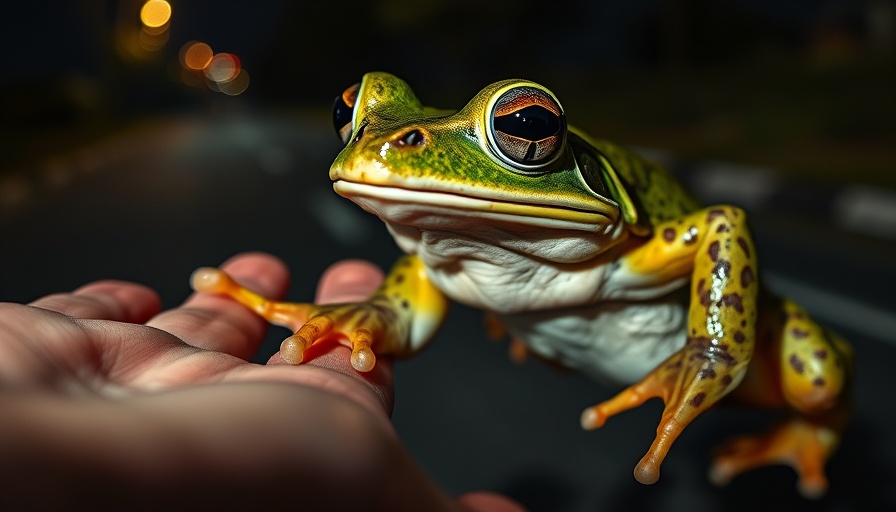
Leopard Toads Are on the Move: Why You Should Care
As summer heats up in South Africa, the western leopard toads are on the move—a sight that is not only fascinating for animal lovers but crucial for travelers exploring the country's natural wonders. This annual migration marks the leopard toads' breeding season as they make their way from Zeekoevlei across Peninsula Road to Rondelvlei Nature Reserve. But this isn’t just a nature story; it’s a reminder of the intersection between human activity and wildlife conservation.
Keeping Nature Safe: The Nature Connect Project
Motorists traveling along Peninsula Road will encounter temporary signage urging them to slow down. The city has installed infrastructure in an effort to protect these migrating creatures—thanks to the Nature Connect project. This initiative has implemented concrete travel tunnels and guiding fences designed to help the toads safely traverse the road while minimizing the risk of road fatalities during their migration. Volunteers are on hand at night to assist the animals, ensuring safer passage, and reports indicate a significant drop in toad-related road deaths since the installation of these underpasses.
Why Should Travelers Pay Attention?
Nature and travel intersect in many exciting ways, especially in South Africa, where ecological initiatives such as this can enhance the travel experience. Being aware of wildlife movements not only adds value to your travel itinerary, but it also enriches your exploration by connecting you with local conservation efforts. Imagine hiking in the scenic beauty of Cape Town and walking alongside these vibrant leopard toads during their breeding season. It’s experiences like these that make trips more memorable.
Eco-Friendly Travel: A Growing Trend
Conservation efforts such as the Nature Connect project align well with the increasing interest in eco-tourism amongst travelers. Those seeking South Africa travel itineraries are now more inclined to include ecotourism hotspots, where they can experience nature while contributing to its protection. Whether you're adventure-seeking in the wilderness, exploring family-friendly parks, or comparing luxurious eco-lodges, such initiatives should be at the forefront of travel planning.
Supporting Local Efforts and enjoying Unique Experiences in South Africa
As travelers, your support can make a tangible impact. By participating in local conservation programs or opting to visit areas that prioritize wildlife protection, you not only experience the beauty of South Africa but also lessen your ecological footprint. These small choices contribute to larger environmental efforts across the globe.
Your Plan of Action: Keep an Eye Out for Wildlife
When traveling through areas at risk for wildlife crossings, allow yourself to be an active participant in conservation. Slow down and be vigilant, especially at night when leopard toads are most active. Personal responsibility can lead to substantial benefits for local wildlife. Whether you’re a backpacker navigating the scenic trails or someone exploring luxury travel options, taking a moment to appreciate the local fauna can elevate your travel experience.
Conclusion: Think About the Impact You Make
As you plan your next adventure in South Africa, consider engaging with the local environment responsibly. The leopard toads are more than just a curiosity; they are a piece of South Africa's rich biodiversity that many are striving to protect. Bridging the gap between travel and conservation makes you a part of something greater—ensuring that future generations can also marvel at the beauty of South African wildlife.
Remember, your travels can significantly impact local ecosystems. So as you navigate through South Africa's stunning landscapes, let the movement of leopard toads remind you to tread lightly and be mindful of nature’s rhythms. Happy traveling!
 Add Row
Add Row  Add
Add 




Write A Comment